Go Lean Commentary
“Come home Bajans …”
“… in 2020”?
This is the campaign challenge to all Barbadian (Bajan) Disapora, to consider coming back to Barbados. For good! (See the story of a sample repatriate/re-patriot in the VIDEO in the Appendix below).
Is this the vision? Yes, this is the hope that is expressed by the island-nation’s Prime Minister:
During her address, the Prime Minister highlighted some of the struggles this country faced in the past and stressed that democracy was a precious gift that must be nurtured and protected, so persons would always have a voice.
She noted that all Barbadians, not only the 300,000 living here but those overseas, must all work together to build the best Barbados.
(See full article below).
But wait, is the Honorable Prime Minister Mia Amor Mottley openly admitting that the country is NOT yet at that destination? But still, she is calling for Bajans to come home.
In all due respect, Madam Prime Minister, “they” are not listening. The Diaspora – of all Caribbean countries – never listens to the appeals of their former homelands. Alas, Barbados is not the first to waste time, talent and treasuries to engage their Diaspora and urge them to come back and/or to invest in the homeland.
This quest had been pursued throughout the Caribbean. Yet the failures has been loud.
Why? Because they – the Diaspora – are gone!
Yes, there is this preponderance for governments (and citizenry alike) in the region to pursue this same Diaspora strategy. During the calendar year of 2017, we published a number of commentaries on this Caribbean pre-occupation, with these entries relating these homelands:
- Grenada – November 3, 2017 – https://goleancaribbean.com/blog/?p=13438
- Dominica – October 18, 2017 – https://goleancaribbean.com/blog/?p=13288
- Haiti – September 30, 2017 – https://goleancaribbean.com/blog/?p=13105
- Jamaica – September 20, 2017 – https://goleancaribbean.com/blog/?p=13040
- Bahamas – September 4, 2017 – https://goleancaribbean.com/blog/?p=12911
- St. Lucia – March 3, 2017 – https://goleancaribbean.com/blog/?p=10657
The Diaspora is not the panacea, or cure-all, for the Caribbean ills. This is the assertion of the movement behind the book Go Lean … Caribbean – available to download for free. Why are we so emphatic in this assertion? The troubling flaw for the Diaspora strategy is that the expectation is that these people who have left ‘here” will now turnaround and fix what is broken here. This is a fallacy! This mistake was committed by these previous governments and unfortunately is being pursued anew in Barbados. See the full news article here:
Title: Come Home Bajans In 2020
By: Sharon AustinPrime Minister Mia Amor Mottley has urged Barbadians living across the world to come home for 2020.
Ms. Mottley made the appeal tonight at the launch of We Gatherin’ Barbados 2020 in Parliament’s Courtyard before a large crowd, including those “watch parties” of Barbadians and friends in Geneva, New York, Beijing, Canada, Washington and Australia.
The Prime Minister told her audience: “Coming together in 2020 isn’t about a single moment in time, but it is about a process. It is about the building of a nation from St. Lucy to St. Philip, from the west coast to the east coast…. 2020 must be about defining who we are as that one people, in this one space….
“2020 is that point, ironically, where vision is perfected, but we have a bigger vision ahead of us…. We, as Barbadians, will play that role because we…live in a world that we see changing around us, and by 2030 we want to be that country in the world that…will no longer contribute to the destruction of mother earth, but that will work to make our placement on this earth carbon neutral.”
Ms. Mottley noted that Barbados was accustomed to excellence and highlighted the island’s lead in cane breeding in the 19th century. She asked how did the country reach such levels of excellence in so many fields, but failed to tell the story to citizens to inspire them to greater heights, not just here, but in the world.
“So 2020, my friends, is about that conversation…telling our story, sharing our passions, coming home for that inspiration…. 2020 is about making that difference to your old primary school or making that difference to the church that helped nurture you in your parish. 2020 is about families recognizing that time on this earth is way too short and we need to get together a little more,” she explained.
She added that Barbados must be that place where global business must be transacted.
During her address, the Prime Minister highlighted some of the struggles this country faced in the past and stressed that democracy was a precious gift that must be nurtured and protected, so persons would always have a voice.
She noted that all Barbadians, not only the 300,000 living here but those overseas, must all work together to build the best Barbados.
We Gatherin’ is a 12-month global celebration of Barbadian excellence, and a recommitment to this country’s successful future and core values that have defined us as a people. 2020 has been designated as the year for Barbadians and those who love this country to come home, reconnect with family and friends, and invest in the rebuilding and development of Barbados.
The initiative will begin in the north of the island in January 2020, and move southward every month, allowing each designated parish to showcase its icons, social life and the food for which it is renowned. The parish celebrations will culminate in St. Michael in November, and We Gatherin’ will climax in December in Barbados.
[Author Sharon Austin can be reached at:] sharon.austingill-moore@barbados.gov.bb
Source: Posted February 22, 2019; retrieved April 30, 2019 from: http://gisbarbados.gov.bb/blog/come-home-bajans-in-2020/?fbclid=IwAR1toA1bQXh0epcWWvxGYh2KNdWXjIrCt5-uPHLOZRAa-_csRF9zaIb844Q
This seems so innocent, so practical, yet as a strategy to elevate the Barbadian society, it is so flawed. This was eloquently explained in a previous blog-commentary, as follows:
The premise for the criticism of this Diaspora strategy is that the ones that have fled the region have done so for a reason; they have been “pushed” or “pulled” away from their homeland. They may still love their “past” country, but can only do so much from abroad. Plus, history documents that they are less inclined to invest back in their country; they are burdened with the concerns of today and the future, that it is illogical to think that they are concerned about their yesterdays. Thusly, all efforts to outreach the Diaspora are usually futile. All of these prior commentaries relate this basic truth about catering to the Diaspora:
The subtle [Diaspora outreach] message to the Caribbean population is that they need to leave their homeland, go get success and then please remember to invest in us afterwards.
… It is so unfortunate that the people in the Caribbean are beating down the doors to get out of their Caribbean homeland, to seek refuge in these places like the US, Canada and Western Europe. … As a result, we have such a sad state of affairs for our Caribbean eco-system as we are suffering from a bad record of societal abandonment.
Thank you, all Diaspora members that have looked back and lent a hand, but the heavy-lifting of reforming and transforming our society must really come from the people who are in the homeland and in the region. For starters, we must try to dissuade people from leaving in the first place and help them to prosper where planted. The record shows that those who do leave, tend to be the ones that we can least afford to lose. These include the professional classes and highly educated ones; one report presents an abandonment rate of 70 percent of the college-educated populations.
Picture a family with limited food supply, serving dinner and “making extra plates” for family members who have left or passed. This would be illogical. We need to be more pragmatic and work a different strategy to assuage our crisis. We need a strategy that embraces those who are still here, not those that “used to be”.
So the problem of a Diaspora-outreach strategy is that it double-downs on the failure of why the Diaspora left in the first place. We need to employ new strategies for the underlying failures. When we look at our Caribbean homeland and see the many failures, we realize that the people on some islands … and the people in their Diaspora cannot solve the problems in the homeland … alone. No, something bigger and better is needed.
So rather than the strategy to “Invite the Diaspora to Remember Us”, there needs to be a Way Forward with strategies, tactics and implementations to elevate the societal engines of Barbados. This Way Forward has just been exhausted in a series of 9 commentaries for the month of April 2019. The Way Forward is presented in the Go Lean book, as it serves as a roadmap for the introduction and implementation of the Caribbean Union Trade Federation (CU). This will benefit Barbados and the rest of the 30 Caribbean member-states.
The foregoing article asserted that Barbados has been home to excellence in the past. This is so true. A lot of the Diaspora that have left – and/or their children – have excelled in their foreign abodes. Look here at this list:
Reference: Prominent Bajans Around the World
Actors
- Stacey Dash (Bajan father)
- Melyssa Ford
- Jada Pinkett Smith
- Meagan Good
- Cuba Gooding Jr. (father is a first-generation Bajan American)
- Omar Gooding
- David Harewood (both parents Bajan)
- LL Cool J (mother is a first-generation Bajan American)
- Mari Morrow
- Gwyneth Paltrow (White Bajan descendant)
- Redd Pepper
- Rihanna
- Robert Christopher Riley (Trini mother, Bajan father)
- Lamman Rucker (mother is a first-generation Bajan American)
Musicians (sample)
- Afrika Bambaataa – musician
- Alison Hinds
- Damon Dash – co-founder of Roc-A-Fella Records; (Stacey Dash’s cousin)
- Grandmaster Flash – Hip Hop musician and DJ
- Faith Evans – singer and actress
- Doug E. Fresh – Hip Hop musician
- Cuba Gooding, Sr. – singer
- Rayvon
- Rihanna – singer, actress, and fashion designer – real name Robyn Rihanna Fenty
- Tweet – singer, born Charlene Keys
Source: Retrieved April 30, 2019 from: https://en.wikipedia.org/wiki/List_of_Eastern_Caribbean_people#Barbados
An elevated society, allows for accomplished people to accomplish right at home.
The goal of the Go Lean roadmap is to facilitate the Caribbean to be a better place to live, work and play. We would do the heavy-lifting, not expecting some Diaspora member to “swing in and save all of society”. No, the Diaspora is not coming to the rescue. Rather a Caribbean confederacy, constituted by all 30 member-states, is the Way Forward; it is our best option.
By us pointing focus on the Diaspora, it encourages more and more people to abandon the homeland and join the Diaspora. Any country growing their Diaspora is bad for that country and bad for the Diaspora members. Despite the foregoing list of accomplished Bajans, most Diaspora members, only barely survive in the foreign lands, especially the first generation. So any official policy to encourage emigration and living-working-abroad – on a permanent basis – is a flawed policy, not a panacea.
So policies that double-down on the Diaspora is actually doubling-down on failure. There should be no need “to leave and remember”. We should never want people to have to leave. We strongly urge every stakeholder of Barbados, and all of the Caribbean member-states, to lean-in to this roadmap to elevate our homeland.
Yes, we can make our homelands better places to live, work and play. 🙂
About the Book
The book Go Lean…Caribbean serves as a roadmap for the introduction and implementation of the technocratic Caribbean Union Trade Federation (CU), for the elevation of Caribbean society – for all member-states. This CU/Go Lean roadmap has these 3 prime directives:
- Optimization of the economic engines in order to grow the regional economy to $800 Billion and create 2.2 million new jobs.
- Establishment of a security apparatus to ensure public safety and protect the resultant economic engines.
- Improve Caribbean governance to support these engines, including a separation-of-powers between the member-states and CU federal agencies.
The Go Lean book provides 370-pages of turn-by-turn instructions on “how” to adopt new community ethos, plus the strategies, tactics, implementations and advocacies to execute so as to reboot, reform and transform the societal engines of Caribbean society.
Download the free e-Book of Go Lean … Caribbean – now!
Who We Are
The movement behind the Go Lean book – a non-partisan, apolitical, religiously-neutral Community Development Foundation chartered for the purpose of empowering and re-booting economic engines – stresses that reforming and transforming the Caribbean societal engines must be a regional pursuit. This was an early motivation for the roadmap, as pronounced in the opening Declaration of Interdependence (Pages 12 – 13):
xi. Whereas all men are entitled to the benefits of good governance in a free society, “new guards” must be enacted to dissuade the emergence of incompetence, corruption, nepotism and cronyism at the peril of the people’s best interest. The Federation must guarantee the executions of a social contract between government and the governed.
xvi. Whereas security of our homeland is inextricably linked to prosperity of the homeland, the economic and security interest of the region needs to be aligned under the same governance. Since economic crimes … can imperil the functioning of the wheels of commerce for all the citizenry, the accedence of this Federation must equip the security apparatus with the tools and techniques for predictive and proactive interdictions.
xix. Whereas our legacy in recent times is one of societal abandonment, it is imperative that incentives and encouragement be put in place to first dissuade the human flight, and then entice and welcome the return of our Diaspora back to our shores. This repatriation should be effected with the appropriate guards so as not to imperil the lives and securities of the repatriated citizens or the communities they inhabit. The right of repatriation is to be extended to any natural born citizens despite any previous naturalization to foreign sovereignties.
xx. Whereas the results of our decades of migration created a vibrant Diaspora in foreign lands, the Federation must organize interactions with this population into structured markets. Thus allowing foreign consumption of domestic products, services and media, which is a positive trade impact. These economic activities must not be exploited by others’ profiteering but rather harnessed by Federation resources for efficient repatriations.
xxiv. Whereas a free market economy can be induced and spurred for continuous progress, the Federation must install the controls to better manage aspects of the economy: jobs, inflation, savings rate, investments and other economic principles. Thereby attracting direct foreign investment because of the stability and vibrancy of our economy.
Sign the petition to lean-in for this roadmap for the Caribbean Union Trade Federation.
—————-
Appendix VIDEO – Moving to Barbados? – https://youtu.be/zpiNbrk7qXo
Liz Neptune
Published on Sep 1, 2016 – So this is the start of my month-long stay in Barbados, my first attempt at living there. A small intro of things to come. A “vacation” that turned in a self-discovering retreat, an amazing adventure and a 2nd chance at love!!
Rate, comment and Subscribe!
If you enjoy my videos please consider a: 1 Time Donation to Paypal: https://bit.ly/2C3rGyT
or Subscribe to Me: https://www.subscribestar.com/liz-nep…
Check out my MERCHANDISE STORE! https://www.lizneptune.com/shop-1
For photography and film/video services, email liznikols@gmail.com
Connect with me!! IG:
@lizzzneptune
http://www.lizneptune.com
https://www.facebook.com/Neptune-Medi…
SC: tracylorde
TW: @lizzzneptune
- Category: Entertainment

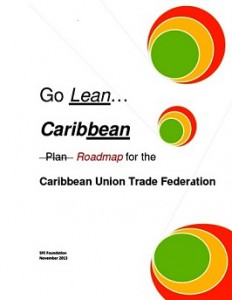 We must pursue the end goals of this plan, ‘whatever it takes’. This is the closing message for our April 2019 series on the Way Forward for the Caribbean. This Way Forward is the plan that was planned, that now needs to be worked.
We must pursue the end goals of this plan, ‘whatever it takes’. This is the closing message for our April 2019 series on the Way Forward for the Caribbean. This Way Forward is the plan that was planned, that now needs to be worked.
 So for the Caribbean, we need to adopt the required community ethos, drop the bad ethos, execute the strategies, tactics and implementations … to elevate our society. We need to do the heavy-lifting, ‘whatever it takes’; we must succeed.
So for the Caribbean, we need to adopt the required community ethos, drop the bad ethos, execute the strategies, tactics and implementations … to elevate our society. We need to do the heavy-lifting, ‘whatever it takes’; we must succeed. Notwithstanding indigenous Amerindian cultures, the Caribbean represents the oldest civilizations in the New World. Columbus made his New World discovery here in the Caribbean:
Notwithstanding indigenous Amerindian cultures, the Caribbean represents the oldest civilizations in the New World. Columbus made his New World discovery here in the Caribbean: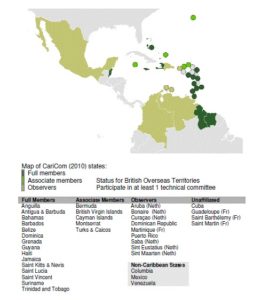

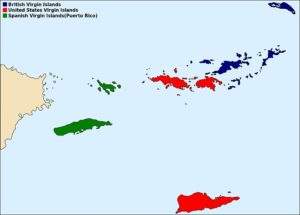
 … it is the assessment of this commentary that Independence is so overrated; rather than the independence, the call is for interdependence. A model of this desired interdependence is the inter-state cooperation in the European Union (EU).
… it is the assessment of this commentary that Independence is so overrated; rather than the independence, the call is for interdependence. A model of this desired interdependence is the inter-state cooperation in the European Union (EU). While we need to look forward, we also need to look backwards. This was the assertion of the 2013 book Go Lean … Caribbean, which advocates for the installation and deployment of a regional power grid heavily dependent on wind energy. The book states (Page 113):
While we need to look forward, we also need to look backwards. This was the assertion of the 2013 book Go Lean … Caribbean, which advocates for the installation and deployment of a regional power grid heavily dependent on wind energy. The book states (Page 113): The energy minister, speaking Friday at Wigton Windfarm’s Initial Public Offering (IPO) investor briefing at the Montego Bay Convention Centre in Rose Hall, St. James, said the production of clean energy from the facility has enabled the country to avoid the purchase of 800,000 barrels of oil, and the emission of one million tons of carbon dioxide, thereby reducing the country’s carbon footprint, the Jamaica Gleaner reported.
The energy minister, speaking Friday at Wigton Windfarm’s Initial Public Offering (IPO) investor briefing at the Montego Bay Convention Centre in Rose Hall, St. James, said the production of clean energy from the facility has enabled the country to avoid the purchase of 800,000 barrels of oil, and the emission of one million tons of carbon dioxide, thereby reducing the country’s carbon footprint, the Jamaica Gleaner reported.
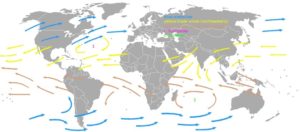
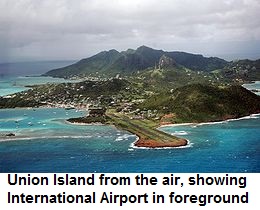

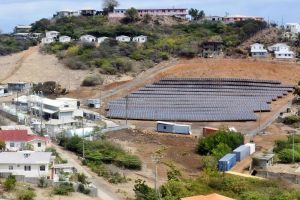
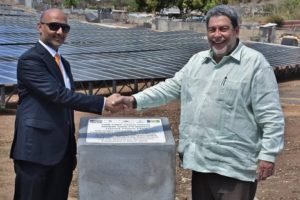 “In the near future, the solar PV farm will generate electricity on the island during the day to supply to the grid. We anticipate that on sunny days, the solar plant will generate excess electricity than is required to supply the average daytime load on the island. The excess electricity will be stored in batteries. The expected annual energy output is approximately 32 per cent of the electricity generated in Union Island in 2018.
“In the near future, the solar PV farm will generate electricity on the island during the day to supply to the grid. We anticipate that on sunny days, the solar plant will generate excess electricity than is required to supply the average daytime load on the island. The excess electricity will be stored in batteries. The expected annual energy output is approximately 32 per cent of the electricity generated in Union Island in 2018. The talk of Special Prosecutors is all the rage today, April 18, 2019:
The talk of Special Prosecutors is all the rage today, April 18, 2019: This is American justice at work. Will this be satisfying? Will there be accountability and consequences for any wrongdoing?
This is American justice at work. Will this be satisfying? Will there be accountability and consequences for any wrongdoing?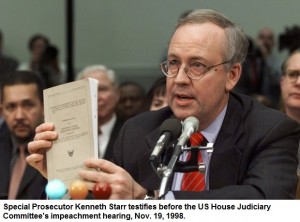
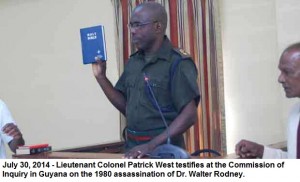

 Apple’s devices also proliferate in the Caribbean; (though no where close to 1 billion units). We therefore have the opportunity to prepare our media offerings for direct-to-consumers via their devices. This is already the Go Lean strategy for the new social media site: www.myCaribbean.gov. As related in a
Apple’s devices also proliferate in the Caribbean; (though no where close to 1 billion units). We therefore have the opportunity to prepare our media offerings for direct-to-consumers via their devices. This is already the Go Lean strategy for the new social media site: www.myCaribbean.gov. As related in a  This entire series asserts that “no man is an island” and that “no island is an island”, therefore the full Caribbean region – all 30 member-states and 42 million people – need to combine, collaborate and confederate to form a Single Market for media and other economic activities. Our failure to do so in the past have imperiled our economic, security and governmental engines.
This entire series asserts that “no man is an island” and that “no island is an island”, therefore the full Caribbean region – all 30 member-states and 42 million people – need to combine, collaborate and confederate to form a Single Market for media and other economic activities. Our failure to do so in the past have imperiled our economic, security and governmental engines. has three new ways to get you watching more TV shows and movies. Unfortunately they all have very similar names, and all start with “Apple TV.”
has three new ways to get you watching more TV shows and movies. Unfortunately they all have very similar names, and all start with “Apple TV.” Go Lean Commentary
Go Lean Commentary
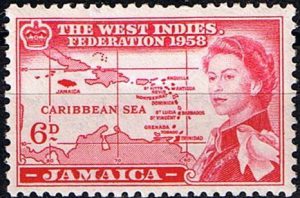 There was a West Indies Dollar, West Indies Regiment (today’s Jamaica Defense Force), University of the West Indies, and the West Indies Cricket Federation just to name a few of the institutions that were formed for this integration purpose – some remain today. But this Federation only lasted 4 years (1958 – 1962). This entity was not destroyed by its enemies, rather it was destroyed internally, by its own people, starting first and foremost with Jamaica. The 2013 book Go Lean … Caribbean – a roadmap for a new integration movement: Caribbean Union Trade Federation (CU) – related this historic summary:
There was a West Indies Dollar, West Indies Regiment (today’s Jamaica Defense Force), University of the West Indies, and the West Indies Cricket Federation just to name a few of the institutions that were formed for this integration purpose – some remain today. But this Federation only lasted 4 years (1958 – 1962). This entity was not destroyed by its enemies, rather it was destroyed internally, by its own people, starting first and foremost with Jamaica. The 2013 book Go Lean … Caribbean – a roadmap for a new integration movement: Caribbean Union Trade Federation (CU) – related this historic summary:
 Jamaica needs to reach back into their past, learn what it was that they did wrong – their fathers did wrong (see Appendix VIDEO below) – accept the learned-lessons, turn a new leaf and then march forward into the future with a determination and devotion to think, feel and act differently and better. This sounds so much like the Serenity Prayer that Alcoholics and Addicts are urged to enchant everyday:
Jamaica needs to reach back into their past, learn what it was that they did wrong – their fathers did wrong (see Appendix VIDEO below) – accept the learned-lessons, turn a new leaf and then march forward into the future with a determination and devotion to think, feel and act differently and better. This sounds so much like the Serenity Prayer that Alcoholics and Addicts are urged to enchant everyday: This entire series asserts that “no man is an island” and that in fact “no island is an island”. Jamaica have always needed to collaborate and confederate with its regional neighbors. Their failure to do so, only imperiled their economic, security and governmental engines. Then their people fled; they left and joined communities abroad where the needed integration, cooperation and harmony existed.
This entire series asserts that “no man is an island” and that in fact “no island is an island”. Jamaica have always needed to collaborate and confederate with its regional neighbors. Their failure to do so, only imperiled their economic, security and governmental engines. Then their people fled; they left and joined communities abroad where the needed integration, cooperation and harmony existed. … the Bahamas. – (See Appendix B below).
… the Bahamas. – (See Appendix B below).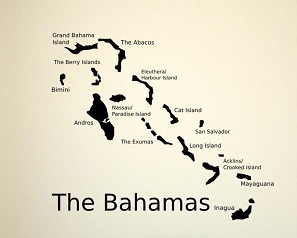 In the 60 years since, the Bahamas has made progress; sometimes
In the 60 years since, the Bahamas has made progress; sometimes  White Paper Title: A Nation in Chaos – The Solution Series – EXCERPT
White Paper Title: A Nation in Chaos – The Solution Series – EXCERPT

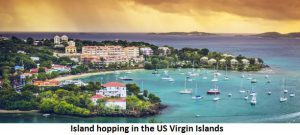 The US Virgin Islands – St. Thomas, St. Croix and St. Johns – are 80 miles east of Puerto Rico. Their small population only peaks at about 110,000; they have a lot of challenges sustaining and elevating their society. If only their economy was bigger.
The US Virgin Islands – St. Thomas, St. Croix and St. Johns – are 80 miles east of Puerto Rico. Their small population only peaks at about 110,000; they have a lot of challenges sustaining and elevating their society. If only their economy was bigger.
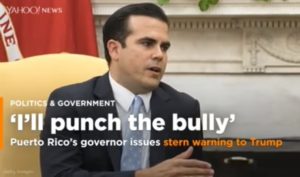 The Washington meeting — which was attended by White House trade adviser Peter Navarro and members of Rosselló’s government — was requested after reports that Trump was considering halting further disaster relief to the beleaguered U.S. territory.
The Washington meeting — which was attended by White House trade adviser Peter Navarro and members of Rosselló’s government — was requested after reports that Trump was considering halting further disaster relief to the beleaguered U.S. territory.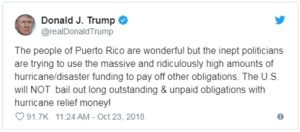
 This consideration brings to mind, an overall discussion of the Way Forward for this country – Puerto Rico – and all Caribbean countries. Our current disposition is dire, a crisis, near-Failed-State status. Yet, the movement behind the Go Lean book posits that a “crisis is a terrible thing to waste”. Here for April 2019, we present a full series of commentaries related to the Way Forward for these 30 Caribbean member-states. The full series is presented as follows:
This consideration brings to mind, an overall discussion of the Way Forward for this country – Puerto Rico – and all Caribbean countries. Our current disposition is dire, a crisis, near-Failed-State status. Yet, the movement behind the Go Lean book posits that a “crisis is a terrible thing to waste”. Here for April 2019, we present a full series of commentaries related to the Way Forward for these 30 Caribbean member-states. The full series is presented as follows: The Puerto Rico Admission Act of 2019, which is sponsored by Rep. Darren Soto, D-Florida, and Puerto Rico Resident Commissioner Jenniffer González-Colón, would give the island statehood within 90 days of passage.
The Puerto Rico Admission Act of 2019, which is sponsored by Rep. Darren Soto, D-Florida, and Puerto Rico Resident Commissioner Jenniffer González-Colón, would give the island statehood within 90 days of passage.